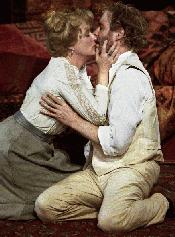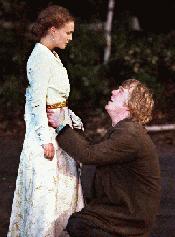SEARCH CurtainUp
On TKTS
LETTERS TO EDITOR
REVIEWS
FEATURES
ADDRESS BOOKS
Broadway
Off-Broadway
DC
NEWS (Etcetera)
BOOKS and CDs
OTHER PLACES
Berkshires
DC (Washington)
London
Los Angeles
QUOTES
FILM
LINKS
MISCELLANEOUS
Free Updates
Masthead
Type too small?
NYC Weather
The Seagull
by Les Gutman
|
If you ever have need of my life, come and take it.
---lines from Trigorin's book referenced by an inscription on the medallion presented to him by Nina in Act III |

|
 |
M. Streep and K. Kline (Photo: Michal Daniel) |
N. Portman and P. S. Hoffman (Photo: Michal Daniel) |
What can one say? Unless you've been holed up at a Russian country estate for the last month, you're probably aware of this summer's hotter than hot ticket, the much-hyped, star-studded production of Chekhov's The Seagull now onstage at the Delacorte. One might be inclined to call this an evening of stars under the stars, but for the clouds that made all three of the press previews cliff-hangers, the threat of rain raising the anxiety level for ticket holders to match that of those in the long queue of standers-by hoping against hope to get in at the last minute. So frenzied is the activity in Central Park these days, the managers of the Delacorte have been forced to take the extraordinary step of checking ticket stubs at the intermission before allowing ticket-holders back in. (Apparently, they've had to deal with gate-crashing second-acters wandering the aisles looking for non-existent empty seats.)
The question of the moment, of course, is whether all of this starpower has been channelled into something worthy of all of the excitement, or whether it has precipitated a supernova. The answer lies somewhere in between, but far closer to the former. Anyone wishing to be told it's not worth standing in the unbelievably long lines for tickets will have to look elsewhere for that advice.
I've written before about the curious balance Chekhov's play demands. On the one hand, it's about hopelessness, beginning with Masha (Marcia Gay Harden) "in mourning for her life" and ending with Konstantin (Philip Seymour Hoffman) killing himself. Each of its many principal characters possesses a pained center because of an awareness of what he or she can never achieve. On the other hand, it is described by the playwright as "A Comedy in Four Acts". With Tom Stoppard providing the witty, contemporized (but faithful) translation, and Mike Nichol's sure comedic instincts at the throttle, few will be surprised to learn it is pitched in the lighter, funnier direction. Yet few could fully expect the degree of rethinking we find in the creation of some of the characters. Bob Crowley may have designed sets and costumes that seat us firmly in Mother Russia, but Mr. Nichols lets none of his characters get any closer than Brighton Beach.
There's a logic in rendering Chekhov's characters as living, breathing organisms of the present day. After all, there's not a situation of any significance in The Seagull that couldn't take place today, and our ability to appreciate the characters, arguably at least, can be enhanced by letting us think of them on our own terms. So Chekhov's characters sound and act like the people Nichols knows, and while this will no doubt rattle some audience members, I'm not among them. (The smart, smooth Stoppard translation, for its part, aids this enterprise, but doesn't abet it.) This is also a Seagull that is cast young, a choice that opens our eyes to aspects of its characters that are fresh and, based on most productions we see, atypical.
Among the constellation of stars on display, none is more anticipated than Meryl Streep, who returns to the stage after an absence of twenty years. However positively one views her filmography (for me, it ranges from brilliant to disappointing), there is no film in which she seems as at home as she does on the Delacorte stage. Her Arkadina is filled with energy, but that verve does not occlude the unsettling effects of her inability to express her love for her son, or to understand her relationship with Trigorin (Kevin Kline). An actress onstage and off, this Arkadina at times displays a penchant for the overtly dramatic that's perilously close to campy, but overall Streep impresses us mightily with her character's texture and her own physical (indeed, athletic) prowess. Although a decade older than her character, Streep beautifully displays Arkadina's studied youthfulness.
Kline's Trigorin reads more youthful than many characterizations, but it's revealing. Here we have a man who found fame young, and now approaches his middle years with dampened expectations. In the first half of the play, Kline's understated performance renders him almost invisible. (It is an interesting aspect of having so many stars onstage at one time that they tend to neutralize each other, the natural attention we would pay top someone of Kline's stature and skill being diverted to the rest of the ensemble.) After the intermission, this aloofness redeems itself as Kline lusciously exposes Trigorin's mind (without ever fully abandoning the understated nature of his performance).
Hoffman's Konstantin is a revelation. While we are accustomed to seeing a broad arc in this character's deterioration, here the anxiety that is his undoing is manifest from the outset. There is a grief in Hoffman's voice that represents one of the production's most compelling features, made all the more poignant when it is interrupted by the vision of an unfulfilled son grasping onto and reverting to the sorts of childhood senses he still craves so clearly. The scene in which he asks his mother to change the bandage on his self-inflicted wound, her stab at motherliness and the subsequent deterioration of all of the attendant hopefulness is glorious.
Though all of these characters are critically important to any rendition of The Seagull, it is Nina (Natalie Portman) who is the linchpin, the evocation of Chekhov's symbolic core. It's also the play's most demanding role. Although Portman is physically ideal, and acquits herself well in the play's first act, there is a hollowness in her work that is her eventual undoing. Although I am hesitant to pick on this young talented actress for her immaturity, it seems as though she lacks the understanding to make her final pivotal scene with Konstantin convincing. In an otherwise fascinating production, we are left with an inchoate whole, not ruined but less than fully satisfying.
The remaining performers are wonderful -- idiosyncratic and well thought out. There is a depth to each that reflects a remarkable level of attention on the part of actor and director alike. Some of the portrayals are so unconventional that they are jolting. One's initial reaction might be negative but on further thought and examination, each in his or her own way is illuminating in a play we feel we know well.
We think of Sorin (Christopher Walken) as an aging man, unsatisfied by his life, uncomfortable in his surroundings and inching towards death. Walken's Sorin, however, still has a lot of spunk. (He also seems like someone who just wandered in from the Catskills by way of Flatbush, a choice that will no doubt irritate some, but that works well.) He seems a man who has been forced into his current condition, not one who has arrived there naturally. His age is not stated in the play, but as Arkadina's brother (she is in her early 40's), "old before his time" seems far more apt than just the old man we usually see. Walken makes him a lot more interesting, engaging and entertaining as well.
The traditional Masha is a sad sack who has turned to alcohol to forget her unhappiness. But Marcia Gay Harden is a tougher broad, sassier and angrier than any Masha you're likely to have seen. She would no doubt have been out of place in Russia a century ago, but she resonates beautifully today. It's the sort of calibrated rethinking that enlightens the play but never without an underlying intelligence. Similar thought has gone into the development of Dorn (Larry Pine), Polina (Debra Monk) and Medvedenko (Stephen Spinella). John Goodman's Shamrayev comes closest to a character's more usual style.
With talk of a transfer to Broadway come new questions: Does this production merit a transfer? How will it be different? The answer to the first is, I would say, yes, especially with the hope that Ms. Portman can grow more into her role. The answer to the second is of course a guess, but the most noticeable differences will be in Bob Crowley's sets, and in the sound design. In the first two acts, Crowley has exploited the natural riches of the park to full advantage (a berm, in which he has planted live trees, has the effect of extending the stage all the way to the lake that Olmsted and Vaux placed behind it well before its time). This will of course be lost. But Crowley's use of the broad stage to create the interior scenes of the play's second half seems unfocused and confusing, and will have to be reined in for a Broadway stage, and that's a good thing. The new sound system in the Delacorte achieves the goal for which it was apparently installed -- you can now hear every word that's uttered onstage, even against the assault of overhead planes, helicopters and the passing siren on 79th Street -- but, as I have complained before, it does so at the expense of location: you can never tell from whom a voice is emanating, since every one of them reaches you through the same speaker. More than once in this production, I found myself searching the stage for a moving mouth. That defect, hopefully, will not be traveling to the theater district.
LINKS TO A FLOCK OF SEAGULLS
New York Review (Blue Light Theater's production of the Stoppard translation)
London Review (Sir Peter Hall's production of Stoppard's translation)
Another London Review (Adrian Noble's production based on Peter Gill's adaptation)
The Seagull: The Hamptons: 1990 (Worth Street Theater's Jeff Cohen's modern update)
Another New York Review (Pearl Theater, Earle Edgerton translation)
|
The Seagull
by Anton Chekhov A new version by Tom Stoppard Directed by Mike Nichols with Morena Baccarin, Vitali Baganov, Craig Bockhorn, Mark H. Dold, John Goodman, Henry Gummer, Marcia Gay Harden, Philip Seymour Hoffman, Kevin Kline, Debra Monk, Larry Pine, Natalie Portman, Thomas Schall, Sharon Scruggs, Stephen Spinella, Meryl Streep and Christopher Walken Set and Costume Design: Bob Crowley Lighting Design: Jennifer Tipton Sound Design: Acme Sound Partners Original Music: Mark Bennett (Michael Friedman, Music Director) Hair and Make-Up Design: J. Roy Helland Running Time: 2 hours, 45 minutes including 1 intermission A production of Joseph Papp Public Theater/NY Shakespeare Festival Delacorte Theatre, Central Park (enter park @81st Street/CPW or 79th/5 Av.) Telephone (212) 539-8750 Public Theater website: www.publictheater.org Opening August 12, 2001, closes August 25, 2001 Tues - Sun @8 (except no performance 6/19 and added performance 6/18); Free, limit of 2 per person (ticket pickup at the Delacorte or Public beginning at 1 P.M.) Reviewed by Les Gutman based on 8/11/01 performance |



